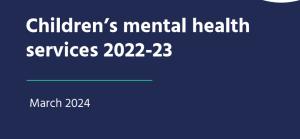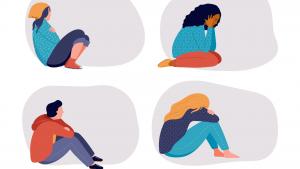Shocking new statistics show that more than a quarter of a million (270,300) children and young people are still waiting for mental health support after being referred to Children and Young People’s Mental Health Services (CYPMHS) in 2022-23, the Children’s Commissioner for England has revealed today.
New figures sourced from NHS England using the Children’s Commissioner’s legislative powers reveal in 2022-23, nearly one million children and young people – 949,200 – were referred to CYPMHS, also known as Child and Adolescent Mental Health Services (CAMHS) – equal to 8% of the 11.9 million children in England.
The annual report on children’s mental health found that almost 305,000 (32%) children and young people referred to mental health services received support. But 28% (270,300) were still waiting for support from mental health services, while 39% (372,800) had their referral closed before accessing support.
Today’s report, Children’s Mental Health Services 2022-23, revealed waiting times for mental health support continue to vary significantly. For the 305,000 children and young people who accessed support the average waiting time was 35 days. But children are still waiting far too long to access the help they need – in the last year nearly 40,000 children experienced a wait of over two years.
The analysis also uncovered geographical variations in waiting times across the country, from an average of 147 days in Sunderland to just four days in Southend.
Today’s report reveals that the most commonly known referral reasons for children and young people were anxiety, followed by reaching crisis – demonstrating the severity of need many children are presenting with.
Shortcomings in NHS England’s data means that the most common reason for a child or young person to be referred to CYPMHS was ‘unknown’, which accounted for a third of referrals.
Children’s Commissioner for England Dame Rachel de Souza said:
“As Children’s Commissioner, I speak to thousands of children about their lives and their concerns – whilst most children are happy, too many are not. This generation of children have faced uncertain and challenging times like no other generation before them – they are bombarded with negative world news, and many are exposed to the harmful impact of the online world. Against this backdrop, it’s unsurprising that so many children and young people are continuing to experience issues with their mental health.
“For children and young people two years can be a significant portion of their young lives, so the long waiting times experienced by some children in this report can feel agonisingly long. Children are still waiting far too long to access the support they need, and for too many children the speed at which they can access support is still down to the luck of where they live. With the right early support, many children would not need access to mental health services.
“It is shocking to see so many children being referred to mental health services because they have reached crisis point. Many problems we see in children’s mental health services stem from local and national leaders failing to prioritise children’s mental health. We need fresh, long-term thinking when it comes to children’s mental and emotional health and wellbeing. Children need environments – both online and offline – where they grow up feeling happy, safe and supported, and aren’t left to feel like second class citizens when it comes to accessing mental health support.”
Today’s report found spending on children’s mental health services – excluding spending on mental health services for children with learning difficulties – increased in both real and cash terms since 2018-19.
Of the total NHS budget for England, Integrated Care Boards (ICBs) spent £997 million on CYPMHS in 2022-23 – equal to 1% of the total budget allocated to ICBs. This compares to £922 million in 2021-22 – an increase of 8% in cash terms. Adjusted for inflation, growth has slowed from 7% between 2020-21 and 2021-22 to just 1% between 2021-22 and 2022-23.
Today’s report underlines that demand for children’s mental health services continue to outstrip the availability of support. Despite welcome increases in investment in CYPMHS, growth has slowed.
The Children’s Commissioner is calling for:
- A bold, strategic 10-year plan for children and young people’s mental health, to ensure fewer children experience mental ill-health, and all who do receive excellent care;
- Reduced waiting times for mental health services, so no child is turned away from mental health support or waits more than four weeks for an initial assessment for their mental health needs, and no more than four weeks after that to receive support;
- Support for children who do not reach the threshold for CAMHS, including through Early Support Hubs, Mental Health Support Teams, from school counsellors; and
- Reforms to the Mental Health Act so that it is fit for the 21st century and accelerates the decrease in the number of children being inappropriately detained and restrained in mental health hospitals – with a view to supporting children at home or in the community.






